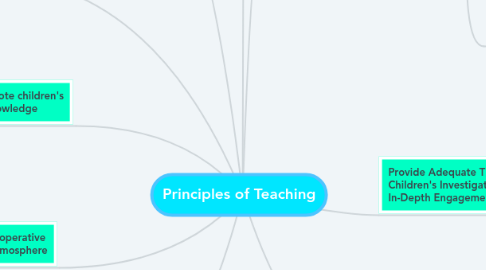
1. Key Words
1.1. Interest
1.2. Experimentation
1.3. Cooperation
2. Best ways to promote children's construction of knowledge
2.1. 1. Engage their interest
2.2. 2. Inspire active experimentation with all its necessary groping and error
2.3. 3. Foster cooperation between adults and children and among children themselves
3. Establish a Cooperative Sociomoral Atmosphere
3.1. All principles rely on this principle - Continuous mutual respect
3.2. Heteronomous morality - obey authorities Autonomous morality - rules are self-constructed and self-regulating
4. Appeal to Children's Interests
4.1. Observe what children do to find out what they want to learn
4.2. Provide activities that may intrigue children and see how they react
4.3. Ask the children what they want to learn
4.4. Allow children to make their own choices
5. Teach in Terms of the Kind of Knowledge Involved
5.1. Physical Knowledge
5.1.1. Observe the reactions of objects to their actions
5.2. Logico-Mathematical Knowledge
5.2.1. Constitutes the general framework of intelligence
5.3. Arbitrary Conventional Knowledge
5.3.1. Can only be gained through transmission from other people in some form
6. Choose Content That Challenges Thinking
6.1. Focus experiences on big ideas that allow in depth study
6.1.1. Is the content significant and purposeful?
6.2. Provide activities and materials appropriate to a wide range of developmental levels
6.3. Analyze activities in terms of regularities and relationships children can construct
6.3.1. simple regularity - under certain conditions, something always happens
7. Promote Children's Reasoning
7.1. Use questions and other interventions that cause children to think
7.1.1. Children express ideas freely
7.1.2. Children find problems and solutions on own (provide counterexamples)
7.1.3. Children provide the information
7.1.4. Children explore and figure things out
7.1.5. Children focus on particular aspect of an activity
7.1.6. Children's efforts are enriched with suggestions
7.1.7. Children may be able to grasp higher level thinking
7.2. Questions to avoid or ask rarely
7.2.1. " Why"
7.2.2. Closed-Ended with one right answer
7.2.3. Purpose of question is a demand
7.3. Interventions that inhibit children's thinking
7.3.1. Indiscriminate, frequent praise
7.3.2. Relentless correction
7.3.3. Putting child on spot, threatening, making child defensive
7.3.4. Not giving child time to think/reflect
8. Provide Adequate Time for Children's Investigation and In-Depth Engagement
8.1. Chosen Activities and Exploration: 1 hour/day = half day ; 2 hours/day = full day
8.2. More than a week for introduced, new topic
9. Link Ongoing Documentation and Assessment with Curriculum Activities
9.1. Assessment ins part of teaching
9.1.1. Assess children's performance
9.1.2. Assess the curriculum

